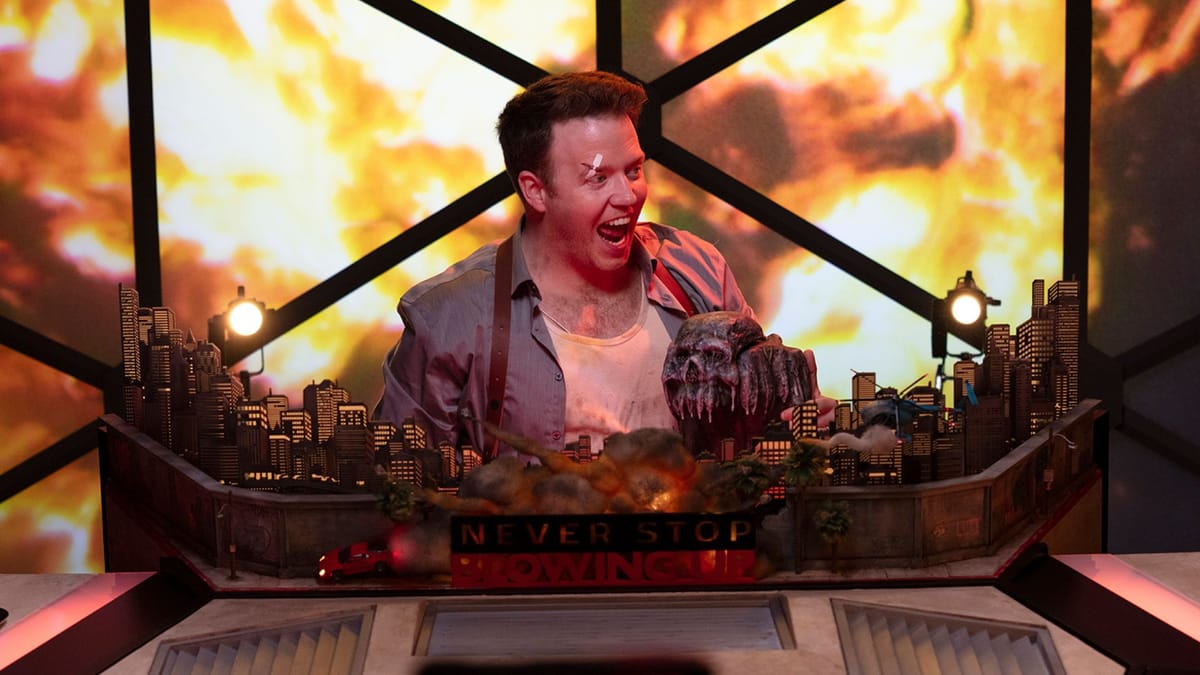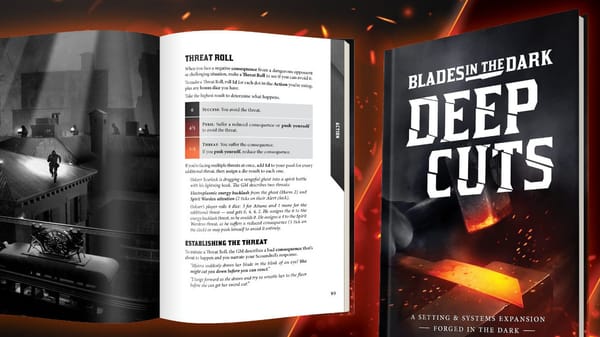Crime Rings, Copaganda, and So Much Gender
Rascal Recaps: Never Stop Blowing Up Episode 2 - “And That’s Whirred Up”

The intro sequence to Never Stop Blowing Up’s second episode (the same one described in the first part of this recap series) reinforces that, yes, you are watching a TV show. With Dropout making a big Emmy push for their other series, after being unable to submit Dungeons and Drag Queens on a technicality, it makes sense that they’re doing everything they can to make the 22nd season of their flagship actual play show as accessible to television viewers as possible.
Post-intro, the episode—titled “And That’s Whirred Up”—opens on Mulligan’s iconic “Hello, one and all!” introduction. This time, he’s clad in a black leather jacket and fingerless gloves, indicating that the episode’s world is not that of Lake Elsinore, California; but the action-filled pocket dimension of Never Stop Blowing Up.
We start the story proper with Alex Song-Xia’s character, Liv Skyler, getting used to navigating the world in the massive body of the crime lord, Kingskin. This episode ventures into the facet of Never Stop Blowing Up I’m most excited to see in an actual play format: performers playing a character in the body of their filmsona, most of whom are a different gender. Throughout “Whirred Up,” each character takes a different approach to how they present their hybrid selves in this new world, and brings a level of camp comedy into a nuanced exploration of identity.
If you die in the VHS, do you die in real life?
Liv discovers Kingskin’s body, much larger and more resilient than her real world counterpart, is able to withstand higher quantities of alcohol. Kingskin also commands significantly more respect (or, more accurately, fear) from his underlings, which works to Liv’s advantage as her high school senior naivety catches up to the reality of her situation. When she hesitates drinking expensive alcohol, stating that she “can’t afford this,” the gang is in utter confusion at this drug lord’s penny-pinching in his own bar. When she awkwardly back peddles the statement as a joke, Kingskin’s henchmen cartoonishly laugh—save for one, who doesn’t think joking about the gang’s finances is funny. He is immediately murdered by another member, highlighting Kingskin’s brutality and an element of criminality the mildly kleptomaniacal Liv is uncomfortable confronting.
"That's right! When you do drugs, sometimes you have ego death!" pic.twitter.com/dDmO8cNinq
— Dimension 20 🎲 (@dimension20show) July 4, 2024
One of Kingskin’s henchmen informs Liv that he—she? The pronouns of this series are about to get messy (just the way I like it)—has a meeting with one of his criminal counterparts: Empresario. The exposition delivered by these NPCs is done in the comically overstated style of early 80’s action movies. What would be objectively bad writing in a scripted series is an intentional commentary on the genre’s aesthetics in actual play, similar to the ways the Mulligan and the player’s highlight the impracticality of action movies—like a secret meeting between gang bosses in a very public balcony at Kingskin’s club.
During the meeting with Empresario, Liv learns that a chemical storage facility used by the drug syndicates has been compromised by “The Sinclair Group” and a shady international agency known as “Santo Patron” is after the two gangs. Empresario accuses one of Kingskin’s men of being a rat, and says if the latter isn’t able to get the chemicals out of the warehouse by the next day, any agreement between the two organizations will be “absolved.” Mulligan makes it clear above the table that Kingskin’s life, and therefore Liv’s, is in real danger. This raises the ultimate question of the Jumanji genre: if you die in the VHS, do you die in real life?





